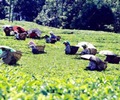
The two-day Hackathon gets its name from the fact that it joins experts from two different fields: Sanitation and Information Technology. The IT experts will develop software solutions to sanitation problems facing developing countries. Besides the Pune Hackathon, versions of the event will take place at 13 other locations across the globe: Manila, Jakarta, Dhaka, Lahore, London, Helsinki, Cape Town, Dakar, Dar es salaam, Lima, Washington, New York and San Francisco.
Issues like solid and liquid waste management, the proper disposal of waste, the construction and use of toilets, and wastewater management have emerged as major challenges to the sustainable development of India.
The Sanitation Hackathon will see teams of programmers working closely with sanitation experts during the weekend-long sessions to create applications that enable social and environmental improvements. The event will address issues ranging from the lack of proper sanitation infrastructure and services to the lack of user-friendly feedback mechanisms.
The Sanitation Hackathon brings together a host of distinguished enterprises. The World Bank's program is part of the far-reaching Sustainable Development Network of that organization. The Bill and Melinda Gates Foundation is also a contributor to the Hackathon. The Indian event at the Infosys campus in Pune includes the IIHS, a group committed to the equitable, sustainable, and efficient transformation of communities across the nation.
Aromar Revi, Director at the Indian Institute for Human Settlements, said: "At IIHS, we are committed to creating sustainable solutions to India's settlement challenges by connecting to and engaging with key stakeholders."
Advertisement
Key objectives of the Sanitation Hackathon include:
Advertisement
Creating a network of atypical partners engaged in finding solutions to sanitation-related challenges
Developing new applications and code designed to address sanitation challenges
Extending reach and quality of sanitation services by adopting innovative uses of IT
Mritunjay Kumar Singh, Associate Vice President and Development Center Head, Infosys Pune, said: "Sanitation, water, and food security are global issues that require immediate attention. In developing countries, poor sanitation poses a serious health risk because it contaminates a limited water supply and attracts disease-carrying insects."
Singh added: "Technology has the potential to address these issues by providing innovative, cost effective, and scalable solutions relevant to developing economies like India. The private sector needs to take leadership on this front and develop sustainable, long-term solutions. Infosys is delighted to partner with the World Bank and IIHS and we are confident that the Sanitation Hackathon will create affordable solutions to these critical problems."
The Hackathon is currently in its second year. In 2011, the Water Hackathon was a gathering of software developers who worked to create applications to monitor and tackle water issues. Jugaad Sensors, one of the winners of that event, is scaling its idea for developing cost effective sensors that determine water quality. Following the successful momentum created by the Water Hackathon, the Sanitation version is attracting local and global partners to support the cause. (ANI)
Source-ANI




![An Introduction - Indian General [Non-Life] Insurance Companies An Introduction - Indian General [Non-Life] Insurance Companies](https://www.medindia.net/images/common/patientinfo/120_100/health-insurance21.jpg)





